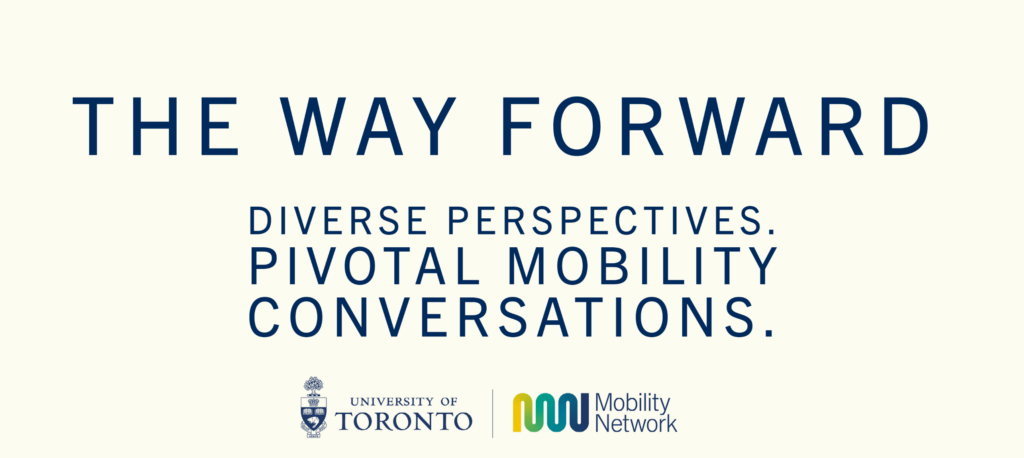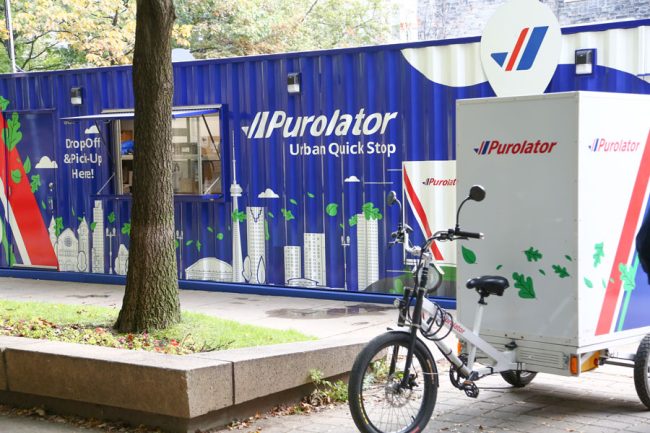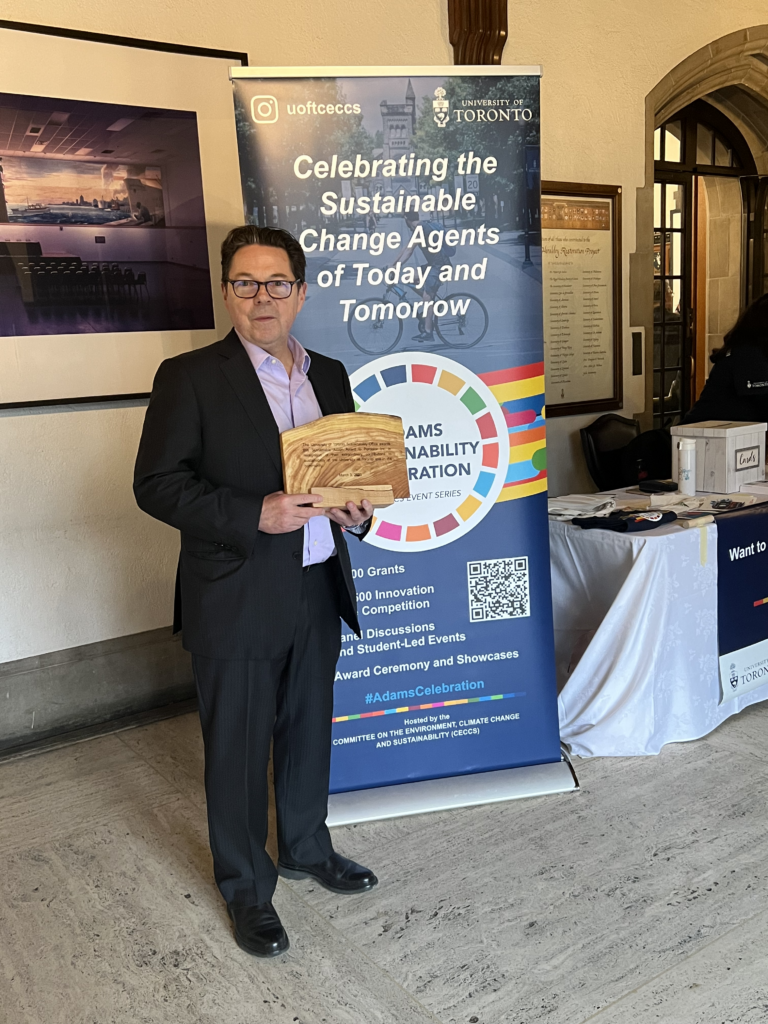Mobility Network presents ‘The Way Forward: Safeguarding reliable, sustainable supply chains’
What are the challenges of achieving these ambitious and critical emission-reduction targets for goods movement?
Speakers
I. Daniel Posen is Assistant Professor in the Department of Civil & Mineral Engineering at University of Toronto, and Canada Research Chair in System-Scale Environmental Impacts of Energy and Transport Technologies.
Dr. Dianne Saxe is one of Canada’s most respected environmental and energy lawyers, with decades of experience as a non-partisan expert and advocate for municipalities, businesses, non-profits and individuals. Councillor Saxe was the last Environmental Commissioner of Ontario, the independent guardian of the Environmental Bill of Rights. In 2019, after she delivered 17 acclaimed reports to the Legislature on energy, environment, and climate, Doug Ford abolished her office. These reports continue to remain highly relevant.
Councillor Saxe is a climate champion who walks the talk. Her bike and the TTC are her primary means of transportation, and she has been a vegetarian for 50 years. She is a member of Canada’s Climate Caucus. Until her election to City Council in October 2022, she hosted the popular Green Economy Heroes (opens in new window) podcast, and ran SaxeFacts Law Professional Corporation.
Councillor Saxe holds multiple accreditations and awards, including a PhD in Law and in Environmental Studies (Hon.), a Law Society Medal for exemplary leadership in environmental law, a Clean 50 award, an Osgoode Hall Law Alumni Gold Key for Lifetime Achievement, and a Global Competent Board Designation. She has successfully run her own small business, a multi-million dollar public office, and sat on the boards of both charities and for-profit corporations. At the University of Toronto, she is a Senior Fellow of Massey College, and adjunct faculty of the School of the Environment.
From November 2020 to August 2022, Councillor Saxe served as Deputy Leader of the Green Party of Ontario, and was principal author of its Roadmap to Net Zero. She also contributed to its Mental Health and Housing policies. She sits at City Council as an independent.
Councillor Saxe is proud to serve Ward 11 – University-Rosedale, where she has deep roots and wide networks. She was born in the riding, as were three other generations of her family. She went to school here and worked on Beverley, Bathurst and Bay. Her synagogue, community centre, and volunteer organizations are in the ward along with her favourite shops and restaurants. Councillor Saxe can often be seen cycling through the ward, or in local parks and ice rinks with her grandchildren.
Against steep odds, Councillor Saxe has protected people, communities, and the natural systems on which our lives depend. She is a champion of smart housing policy, the new climate economy, and transit and mobility solutions. She will fight to make Toronto a prosperous and just city while protecting nature and keeping public spaces in good repair.
Adam Thorn is the director of the Pembina Institute's transportation program and is based in Toronto. Adam holds a doctorate in Public Policy from Toronto Metropolitan University and master’s and bachelor’s degrees in Political Science from Western University.
Moderator
John Robinson is a Professor at the Munk School of Global Affairs and Public Policy, and the School of the Environment, at the University of Toronto; an Adjunct Professor with the Copenhagen Business School; and an Honorary Professor with the Institute for Resources, Environment & Sustainability at The University of British Columbia. At the University of Toronto, he is Presidential Advisor and Co-Chair of the President’s Advisory Committee on the Environment, Climate Change and Sustainability.
Register to attend
Register on Eventbrite for this virtual event.
Free. All are welcome.
If any specific accommodations are needed, please contact mobilitynetwork@utoronto.ca. Requests should be made as early as possible.
About The Way Forward

Explore the many ways mobility affects our lives at The Way Forward, a panel discussion series. Join the conversation!
All sessions take place online on Tuesdays from 4:00 p.m. to 5:00 p.m. and are free. Registration is required.
An introductory overview will be followed by short presentations, a moderated panel discussion, and audience Q & A. This event will be recorded and shared.
Interested in more The Way Forward sessions?
See the complete Spring 2023 schedule for The Way Forward.
Professor Matthew J. Roorda, on behalf of the Smart Freight Centre, invites you to the next seminar in the Smart Freight Centre’s Leadership Seminar Series.
Professor Diana Ramirez-Rios will present "Using Freight Trip Generation to Estimate Impacts on Air Quality of Diesel Truck Emissions of Urban and Industrialized Areas" on Friday, March 24, 2023, from 11 AM to 12 PM at the ITS Lab, Room SF3103, Sandford Fleming Building.
A hybrid option will be available. The seminar will be streamed at https://utoronto.zoom.us/j/87172403711.
All are welcome to attend this free event presented by the Smart Freight Centre and the University of Toronto ITE Student Chapter, UT-ITE. No registration is required. If any specific accommodations are needed, please contact smartfreight@utoronto.ca as early as possible.
About the presentation
Today’s society faces numerous challenges exacerbated by climate change, globalization, and socio-economic inequities, to name a few. Air contamination from diesel and gasoline-fueled vehicles is one of the main concerns and issues discussed at a worldwide level. Thirty countries are supporting the Glasgow Climate Pact (COP26) initiative from the United Nations to have zero emissions by 2040. The United States is not part of the group, but the country’s policies are in line with a zero-emissions policy, which heavily concerns the freight transportation sector.
This research focuses on the diesel and gasoline-based vehicles’ emissions caused by daily freight trip generation (FTG) activity in urban and industrialized cities.
We showcase the case of Oakland, California, home to one of the largest ports and next to one of the largest metropolitan areas in the United States. We used data from Oakland’s industrial district and adjacent commercial districts to estimate daily FTG and air quality health data to analyze the impacts of air pollutants on residents in the city. This study provides a unique analysis of the impacts caused on Oakland residents’ health due to the daily exposure to the harmful pollutants caused by freight vehicles (CO, CO2, NOx, PM2.5, and PM10). The findings help us develop novel data-driven permitting strategies that could potentially reduce air pollution exposure from freight activity for residents adjacent to industrial and commercial areas.
About the speaker

Dr. Diana Ramirez-Rios is an assistant professor at University of Buffalo with a PhD in Transportation Engineering from Rensselaer Polytechnic Institute and a B.S.-M.S. in Industrial Engineering. Her work focuses on freight transportation, supply chain and logistics, and humanitarian/disaster response logistics. Her research includes freight demand modeling, parking simulation, facility location, supply chain coordination, post-disaster location and distribution, and cooperative game-theoretic models. Diana holds leadership positions in several professional organizations including the POMS as the Regional VP for the Americas, and Subdivisions Council Representative at INFORMS. She is also a member and paper review coordinator for the Freight Data Committee at the Transportation Research Board. She is the recipient of the Karen and Lester Gerhardt Prize in Science and Engineering, the Thomas Archibald Bedford Prize, the WTS Helene M. Overly/ Leonard Braun Graduate Scholarship, ENO Future Leaders in Transportation Fellow, and the CEE-MIT Rising Stars.
Above: Purolator's Dr. Daniel Baron (L) accepts U of T Sustainable Action Award from Scott Hendershot (R), Senior Manager, Sustainability Office, University of Toronto, at the Adams Sustainability Celebration Award Ceremony, March 3, 2023. (Photo: Tory Grewar)
Purolator Inc. was awarded the University of Toronto Sustainable Action Award, External Business or Partner category, on March 3, 2023, at the 2022-23 Adams Sustainability Celebration Award Ceremony and Innovation Pitch Prize Competition held at Hart House, University of Toronto.
The award recognizes individuals and teams who make tangible contributions to sustainability at U of T. Purolator received the award for the recent launch of their Urban Quick Stop mini hub pilot project on the U of T St. George campus.
The Urban Quick Stop serves as a mini hub for couriers on electric cargo bikes to retrieve and deliver packages to the surrounding areas, thus reducing the need for traditional courier delivery trucks. This results in a more sustainable approach to delivering and less traffic congestion.

Our Urban Quick Stops and our partnership with the university is helping address challenges associated with last-mile delivery.
Additionally, the involvement of U of T graduate and undergraduate students in this project, and as part of Purolator Research Chair retained activities, has been invaluable. They have brought new ideas and perspectives, helping us continuously improve and innovate.
Khelil Khelil, Senior Manager of Applied Research and Innovation, Purolator
In partnership with the university, Purolator expects to achieve many sustainability benefits, including a reduction of approximately 5,800 km travelled per year on the U of T campus and neighbouring community roads. This translates into approximately 2.3 tonnes of CO2 emissions per year. The project also reduces the emission of nitrogen oxides (NOx), a pollutant that causes respiratory health problems, leading to measurable health impacts.
Purolator is most deserving to receive the Sustainable Action Award, as an outcome of their leadership toward making this project happen on the University of Toronto campus. It is a unique example of sustainability research ‘hitting the road’.
Matthew Roorda, U of T civil engineering professor and Canada Research Chair in Freight Transportation and Logistics
Purolator states that they are proud to partner with the University of Toronto and look forward to expanding their Urban Quick Stops across Canada in the future.
As their prize, Purolator received a plaque made out of honey locust wood reclaimed from the U of T Landmark Project. The inscription reads: "The University of Toronto Sustainability Office awards this Sustainable Action Award to Purolator Inc. in recognition of their extraordinary contributions to sustainability at the University of Toronto and in the community."
The 2023 Adams Sustainability Celebration Innovation Prize pitch competition and award ceremony is supported by the donation of Wendy Adams.

Adams Sustainability Celebration Award Citation
Purolator, in partnership with University of Toronto, has established a successful e-cargo tricycle demonstration project.
On August 22, 2022, Purolator replaced delivery trucks on the University of Toronto St. George campus, and in neighbouring communities, with e-cargo tricycles operating from a minihub located at 60 St. George Street.
This pilot is demonstrating the potential for e-cargo tricycle deliveries with potential expansion to other locations across Canada. Purolator is now delivering more sustainably on campus, with reduced emissions, fewer cyclist conflicts, and truck driver health improvement. Gasoline powered trucks have been replaced by electric cargo tricycles, leading to measurable health impacts.
Courier trucks emit about 1.4 g of nitrogen oxides (NOx) per km, a pollutant which causes respiratory health problems. The project results in an estimated reduction of 800 g of NOx annually from Purolator trucks.
A long list of graduate and undergraduate students have been involved in research associated with this project. These include women, Black and Muslim students, all under-represented groups in transportation and logistics.
U of T installed air quality sensors inside the cab and outside the cab of a Purolator truck. U of T found that drivers were exposed to a 25% higher rate of particulate matter (PM2.5) in the cabs of their trucks, which has been eliminated for e-cargo tricycle drivers.
In addition, truck traffic has been reduced by approximately 5800 km per year on campus and in the neighbouring communities. This translates into approximately 2.3 tonnes of CO2 emissions/year.
The project is also an economic benefit for Purolator, since the cost of operating and maintaining the electric cargo bikes is significantly lower.
Aside from obvious benefits from zero emissions vehicles, safety improvements exist for cyclists on campus. Trucks in traffic and parked on the roadside create safety conflicts with cyclists, which have been virtually eliminated with e-cargo tricycles.
They plan to expand the pilot to locations across Canada.
Purolator has worked for years in partnership with University of Toronto, the City of Toronto, Pembina Institute, and their research funding was matched by City of Toronto, Region of Peel, and NSERC. Two items required approval from Toronto City council (approval of electric cargo bikes over 120kg, and approval of a minihub on City of Toronto parking spots), which required a major advocacy effort.
Purolator is most deserving to receive the Sustainable Action Award, as an outcome of their leadership towards making this demonstration project happen on the University of Toronto campus. It is a unique example of sustainability research ‘hitting the road’.
With files from U of T Sustainability Office and Purolator Inc.
Applications are now closed
Mobility Network is proud to host its 2023 summer school on the theme “Measure what matters: Urban mobility in an era of climate emergency.”
The summer school will take place June 20 and 21, 2023, at the University of Toronto’s St. George campus.
About the summer school
The purpose of Mobility Network Summer School 2023 is to develop a roadmap for evaluating government investment in transportation infrastructure.
Working in teams, students will design a performance measurement framework to quantify the economic, climate, and societal impacts of transportation infrastructure investments and methods to quantify the measures they choose to include in their framework. Then, they will apply their measurement framework to a case study of a previous or planned transportation investment, for which funding may or may not be confirmed, to determine if the investment should proceed. Teams will draft policy briefs (200-300 words) that articulate in lay terms why their assigned project is a good or bad investment.
A set of short lectures will present methods to measure travel demand, economic impact, GHG emissions, and social impacts, among others.
A reading list of background materials will be provided in advance of summer school.
Instructors
- Professor Marianne Hatzopoulou, Department of Civil & Mineral Engineering, University of Toronto
- Professor Daniel Posen, Department of Civil & Mineral Engineering, University of Toronto
- Professor Laura Minet, Department of Civil Engineering, University of Victoria
- Dr. Junshi Xu, Research Associate, Department of Civil & Mineral Engineering, University of Toronto
Syllabus and reading list
Download the Mobility Network Summer School 2023 syllabus.
Requirements
There is no cost to attend, but space is limited. Applicants must:
- be graduate students or postdoctoral fellows at a Canadian university;
- commit to attend the summer school from 12:00 p.m. to 5:00 p.m. on June 20, 2023, and 9:00 a.m. to 5:00 p.m. on June 21, 2023;
- submit an application;
- if accepted, bring their own laptops.
Schedule
Day 1: Tuesday, June 20, 2023
12:00 p.m. Lunch and registration
12:45 Introduction: Prof. Marianne Hatzopoulou
1:15 Brief presentations on case studies : Dr. Junshi Xu
2:00 Guest speakers (30 min. each): Prof. Marianne Hatzopoulou, Prof. Daniel Posen, Prof. Laura Minet
3:30 Breakout groups around each case study. Groups go over case studies together; Identify roles and prepare a plan for the development of the performance measures and quantification approaches.
5:00 Groups report on chosen case study and proposed plan
5:30 End of Day 1 program
6:00 Welcome reception (optional) to 8:00 p.m.
Day 2: Wednesday, June 21, 2023
8:30 a.m. Breakfast available
9:00 Break-out groups identify a list of indicators that they believe are important, that can be measured, and which are relevant to their case study
10:45 Break-out groups develop methods for quantifying each indicator and identifying data needs
12:30 p.m. Lunch
1:30 Break-out groups estimate/guess the potential outcomes of the case study in terms of their indicator framework
3:00 Break-out groups prepare a 200-word policy brief (a short summary of how their work can enhance the evaluation of the case study) and final presentations
3:30 Groups report on work
4:30 Completion of Summer School feedback survey
4:45 End of Day 2
Applications are now closed
Mobility Network 2023 Summer School is fully subscribed, and applications are closed. We regret that capacity is limited.
Notification of results
Notifications confirming acceptance were be emailed to applicants on a rolling basis.
Emerging Mobility Scholars Conference 2023
We recommend that summer school participants also register to attend the Emerging Mobility Scholars Conference which directly follows Summer School on June 22-23 at the University of Toronto. Get the details and register (free). Abstract submissions close March 10.
Co-sponsor
Mobility Network Summer School 2023 is co-sponsored by Positive Zero Transport Futures, Department of Civil & Mineral Engineering, University of Toronto.
Questions?
Email us at mobilitynetwork@utoronto.ca.
City Logistics for the Urban Economy (CLUE) is proud to present its 2nd annual symposium, showcasing the research of the project's second year and looking ahead to the future.
Invitation-only and in person.
Details TBC.
Symposium Chair
Dr. Matthew Roorda, Professor, Department of Civil & Mineral Engineering, University of Toronto and Principal Investigator, City Logistics for the Urban Economy (CLUE).
Positive Zero Transport Futures and Mobility Network will host the Emerging Mobility Scholars Conference June 22-23, 2023 at the University of Toronto.
We invite graduate students and postdoctoral fellows across Canadian institutions to join us in person at the University of Toronto to exchange ideas and showcase your research relative to mobility and climate change.
The conference theme is:
Cause or Solution? Urban mobility in an era of climate emergency
Due to socioeconomic shifts and the need to achieve deep cuts in greenhouse gas (GHG) emissions, Canada will experience an unprecedented transformation in urban infrastructures, policy responses, and new technologies.
Nowhere is this truer than in the transportation sector, which is one of Canada’s largest GHG emitters and has historically been relatively impervious to change due to its extreme dependency on fossil fuels.
This transformation in our mobility systems needs not only to mitigate climate change but also enable community benefits in an equitable manner. It is crucial that efforts to decarbonize our urban areas be informed by the co-benefits of GHG reduction.
Conference topics
- Co-benefits of decarbonization
- Land use and transportation planning
- Technological response to climate change
- Equity and environmental justice
- Transportation and health
- Urban resilience planning
- Planning and politics of climate change
- Air pollution in a changing climate
- Climate extremes: Data and modelling
Call for Abstracts
- Abstracts to be 300 words or less.
- All abstracts must be submitted by March 10, 2023.
- Submit your abstract through the submission web portal or this QR code:
Important dates
- February 9, 2023: Registration opens.
- March 10, 2023: Abstract submission deadline.
- April 10, 2023: Decisions on abstracts.
- June 20-21, 2023: Mobility Network Summer School 2023 "Measure what matters: Urban mobility in an era of climate emergency"
- June 22-23, 2023: Conference.
Register
Registration is now closed.
Sponsorship
Interested in sponsoring this conference? Please see sponsorship details on the Positive Zero website.
Conference Organizers
Co-Chairs
- Marianne Hatzopoulou, Director, Positive Zero Transport Futures, University of Toronto
- Eric Miller, Director, Mobility Network, University of Toronto
Organizing Committee
- Shayamila Gamage, Program Director, Positive Zero Transport Futures Postdoctoral Fellow, University of Toronto
- Junshi Xu, Program Director, Positive Zero Transport Futures Postdoctoral Fellow, University of Toronto
- Judy Farvolden, Managing Director, Mobility Network, University of Toronto
- Pat Doherty, Events & Communications Coordinator, Mobility Network, University of Toronto
- Khadija Butt, Educational Specialist, Mobility Network, University of Toronto
- Marc Saleh, PhD student, University of Toronto
- Shoma Yamanouchi, Postdoctoral Fellow, University of Toronto
- Miranda Doris, PhD student, University of Toronto
- Jiaoyang Li, PhD student, University of Toronto
- Cynthia Dion, Research Administrator, McGill University
- Saba Sabet, PhD student, Toronto Metropolitan University
- Kimia Kamal, PhD student, Toronto Metropolitan University
- Elahe Sherafat, PhD student, Toronto Metropolitan University
- Megha Bisht, PhD student, University of Montreal
- Julien Vachon, PhD student, University of Montreal
Faculty Advisory Committee
- Scott Weichenthal, McGill University
- Greg Evans, University of Toronto
- Meghan Winters, Simon Fraser University
- Jeffrey Brook, University of Toronto
- Bilal Farooq, Toronto Metropolitan University
- Shoshanna Saxe, University of Toronto
- Audrey Smargiassi, University of Montreal
- Amir Hakami, Carleton University
- Patrick Hayes, University of Montreal
- Laura Minet, University of Victoria
- Daniel Posen, University of Toronto
Questions?
Please see the full conference details as available on Positive Zero's website, or contact positivezero.civmin@utoronto.ca with any questions.
The UTM Mobility Network (UTM MN) congratulates and is pleased to provide support to Fall 2022 Graduate Research Award recipients Kerstyn Lutz, Gonen Steinberg, and Devin Y. Wu.
Read about these award-winning students and their research projects below.

Kerstyn Lutz
Active School Travel Interventions & Children’s Mobility
Kerstyn Lutz's research project for the Mobility Network focuses on active school travel in Mississauga.
Lutz is a PhD candidate supervised by Professor Matthew Adams in the Department of Geography, Geomatics and Environment at UTM.
Lutz's research interests are children’s air pollution exposure at school and during school travel and how active school travel interventions can increase children’s mobility and reduce school air pollution.

Gonen Steinberg
How Urban Power Relations Shape, and are Shaped by Robotic and Autonomous Systems in Transportation & Delivery Logistics
Gonen Steinberg's research project for the Mobility Network focuses on how urban power relations shape, and are shaped by, robotic and autonomous systems in transportation and delivery logistics.
Steinberg is a PhD candidate at the Faculty of Information, supervised by Professor Beth Coleman in the Institute of Communication, Culture, Information and Technology at UTM.
Steinberg's research employs critical theory to explore the intersection between digital media and urban space and life.

Devin Y. Wu
Exposures to Severe Noise Pollution & its Effects on Human Mobility
Devin (Yongzhao) Wu's research project for the Mobility Network focuses on exposure to severe noise pollution.
Wu is an MSc student supervised by Professor Jue Wang in the Department of Geography, Geomatics and Environment at UTM.
Wu's research interests are GIS, Environmental Health and Human Mobility.
About UTM MN Graduate Student Research Awards
The students featured above received the second round of UTM MN Graduate Student Research Awards.
The movement of goods is as critical to the equity, sustainability and productivity of society as is personal mobility, but it often receives much less research and policy attention. COVID-19 restrictions highlighted our dependency on national, continental and international supply chains to keep our society and our economy functioning. How do we reduce the carbon footprint of freight movements, as well as their impacts on communities and roadway operations, while maintaining the efficiency and effectiveness of our supply chains? How do we ensure the resiliency of the logistics systems that support urban goods movement? How do we accommodate, regulate and adapt to e-commerce?

